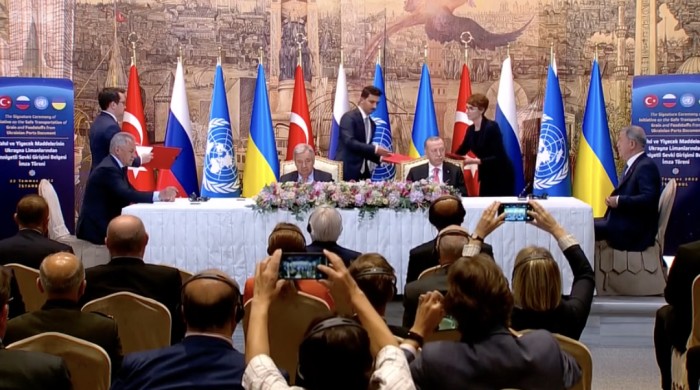Russia and Ukraine have signed a landmark deal allowing grain exports to resume from Black Sea ports in a move that could help ease the input cost crisis that has hit pig farmers since the war started in late-February.
The blockade of the Black Sea ports has resulted in an estimated 20 million tonnes of grain being currently stuck in Ukraine, which would otherwise have been exported. The accord opens the way to ‘significant volumes of commercial food exports’ from three key Ukrainian ports – Odessa, Chornomorsk and Yuzhne, Sky News reports.
The deal, which was also signed by the UN and Turkey at a ceremony in Istanbul, has raised hopes that an international food crisis could be averted. Many people in the world’s poorest regions, including in North Africa, rely heavily on grain exports from Ukraine, while the situation has sent cereal and some oilseed prices spiralling around the world, which has resulted in big hikes in the cost of pig feed.
UN Secretary General Antonio Guterres called on Russia and Ukraine to fully implement the accord, which he said would benefit developing countries ‘on the edge of bankruptcy and the most vulnerable people on the edge of famine’.
Turkey’s President Recep Tayyip Erdogan says the deal will ease global food inflation. He said the deal’s implementation will be run by a joint co-ordination centre in Istanbul. Turkey will inspect ships to ensure they are not carrying weapons.
The EU has cautiously welcomed the deal. Its foreign policy chief Josep Borrell said: “Today’s Istanbul agreement is a step in the right direction. We call for its swift implementation.”
EU farming bodies Copa and Cogeca welcome the agreement, which it said could ease a further rise of global food insecurity and market disruptions.
“It is an encouraging signal for fellow Ukrainian farmers and agri-cooperative colleagues after months of incredible hardships and uncertainty,” it said.
“After two months of talks, this agreement is indeed a hopeful sign of progress towards the easing of global food crisis, which has been on top of our agendas since the war started. European farmers and agri-cooperatives hope that this agreement can help stabilise the markets, and prevent further rise in inflation and food and energy prices globally.
“Even with this ‘beacon of hope’, as defined by UN Secretary General António Guterres, many challenges still persist, and European farmers and agri-cooperatives remain vigilant and ready to do their part in addressing them, counting on the support of the EU institutions.”
- Picture: BBC




